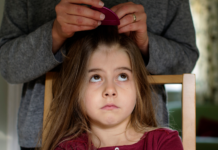Driving to school after a stressful morning, arguing over socks {my six-year-old’s biggest issue at 7 AM!}, my daughter says in tears, “I hate my life, it is stupid.”
My first thought was to get after her for talking that way, but a negative reaction to a negative statement would just make the situation worse. So, that morning I chose to just continue driving to school without a response. I turned the radio up and contemplated: “Did I do this to her? Has she heard me say this before?” I spent the whole day trying to figure out what to do. I finally realized that the best thing to do was teach.
- Punishing her would make her think that she had done something bad.
- Lecturing is like saying that you are doing something wrong.
- But teaching is explaining that there is a better way.
By the time I picked Miss A up from her after-school program I had come up with a few ways to teach her to be more positive. I started by explaining that I understood that she had been very upset that morning, but saying that you “hate your life and that it is stupid” makes others worried that things are worse than they really are (I was VERY careful to keep the discussion age-appropriate; there are deeper topics that will be discussed as she gets older). Overall, we talked about using negative words and how they make others, as well as ourselves, feel bad and some ways that we can learn together to be more positive.
Here are some things that I have started trying to do every day to help teach positive thinking:
- Make her feel that a decision she made on her own was awesome. My daughter has a colorful sense of fashion and often chooses outfits that make me cringe, but I tell her I love them anyway. After all, she did get herself dressed, right?

- Discuss a negative situation that happened. I ask her to give me examples of how it could be turned around and made positive. She often gets upset that TV control is handed to dad on the weekends, so we have had several conversations revolving around this topic. She has decided that this is either time that she can snuggle with Daddy or have quiet time to herself.
- Make her aware of my own mistakes. I remember as a child thinking that my dad was perfect (he is absolutely human and I have learned this over time). It is important to me that my children understand that I make mistakes too, and it is okay. I just figure out a way to fix them without getting upset. This can be tricky. I am not saying make life-altering mistakes public, but things like leaving the grocery list on the kitchen table, and finding yourself in aisle 2 with no intentions of going home to get it.
- Use positive words whenever possible. She is ALWAYS listening, so I carefully choose my words. This is proving to be my hardest step. As an educator, I have two different vocabularies: one for the classroom and another for anytime little ears aren’t listening. I have recently realized that I use the latter at home with the philosophy “do as I say, not as I do“. This is not the way I should be teaching my own children, so I am working VERY hard to not use obscenities when I drop the chicken on the floor or someone cuts me off on the expressway!

I have found in attempting to follow these tips my daughter and I, are becoming more positive. If I can think and act more positively, then my daughter will be able to as well!















